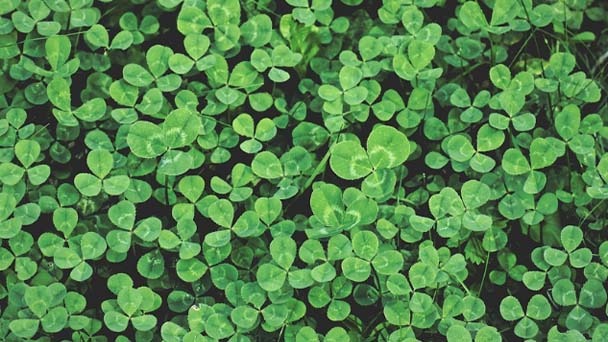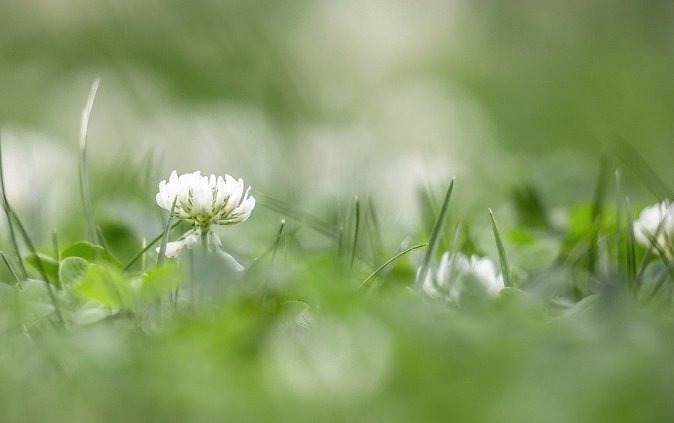When to Plant Clover - Fall or Spring?
Written by Ivy
Dec 16 2022

Knowing when to plant clover is essential whether you are growing it for culinary use or purely aesthetic reasons.
The spring season is the ideal time to plant clover. Wait until nighttime temperatures are between 35 and 45 degrees Fahrenheit. Plant the seeds in the spring because young clover requires a lot of water. This will happen in the majority of areas between April and May.
Best Time to Plant Clover
1. in Spring, Late Summer, and Fall
As previously mentioned, the clover growing season starts after the date of the last spring frost, which is typically in mid-April or mid-May.
It is still possible to garden in July if you miss this window of opportunity to sow clover seed in the late summer.
Furthermore, fall clover planting is possible because this herb can grow as long as there isn't a frost. Provide the plant with six weeks to grow before the first frost, but ideally, fourteen weeks before winter for the best results.
You must check the first and last frost days of your city or county on almanac.com in light of these facts.
For the time being, the estimated ice dates for each USDA hardiness zone are listed below.
| Zone | Examples of places in each zone | First frost | Last frost |
| 1 | North Slope and Fort Yukon in Alaska | May 22 – June 4 | August 25 – August 31 |
| 2 | Northwest Arctic, Yukon-Koyukuk, and Bettles in Alaska | mid-May to May 22 | First week of September |
| 3 | Warren, Hallock, and Walker in Minnesota | Within the first half of May | September 8 – September 15 |
| 4 | Manning, Bowman, Carson, and most places in North Dakota | April 24 – May 12 | September 21 – October 7 |
| 5 | Harlan, Fort Dodge, Ames, and most places in Iowa | From April 7 to the end of the same month | October 13 – 21 |
| 6 | Cumberland, Allegany, and Washington in Maryland | April 1 – April 21 | October 17 to end of October |
| 7 | Roanoke, Lynohburg, and Woodbridge in Virginia | March 22 – April 3 | October 29 to November 15 |
| 8 | College Park, Athens, and Macon in Georgia | March 13 – March 28 | November 7 – November 28 |
| 9 | Zavala, Frio, and La Salle in Texas | February 6 – end of February | November 25 to December 13 |
| 10-13 | Santa Barbara, Los Angeles, and San Diego in Southern California | Not applicable | Not applicable |
2. When the Temperature's Right
The temperature outside has an impact on when to plant clover. For instance, the Balansa, Dixie, and Barduro varieties germinate best in environments between 51.6°F and 63°F (10.9°C and 17.2°C).
All clover varieties should be grown at a minimum temperature of 40°F, and sprouting can begin within a week if the soil and air are sufficiently warm (>59°F).
This plant cannot withstand extremely cold temperatures, as you might have guessed based on the information on frost dates. For clover, -35°F is the absolute minimum temperature.
3. When the Soil Has the Right PH
Typically, clover requires a pH of 6 to 7. Look up the variety you intend to grow to be cautious.
For example, the Persian variety does best in the alkalinity/acidity range of 6.0 to 8.0, while the Ball variety requires a pH range of 6.5 to 8.5.
How to Plant Clover Seeds?
It is essential to test the soil and, if necessary, adjust its pH before planting clover seeds.
To do this, purchase a testing kit and adhere to the directions provided by the manufacturer. In most cases, the product will assist in determining not only pH but also levels of nitrogen, phosphorus, and potash.
Use lime or sulfur to adjust the alkalinity or acidity of your soil if necessary.
- Use a lawnmower to cut off any grass that is on the ground.
- Clover seeds can now be sown in the soil. Use 2 ounces of seeds per 1,000 square feet whether spreading by hand or with a spreader.
Likewise, adhere to the spacing guidelines for your particular plant variety. For instance, the standard spacing between rows for red clover is 6 to 18 inches.
- It's necessary to rake the seeds into the ground at a depth of ¼ inch after they have been distributed evenly. If you dig deeper, clover germination time might never arrive.
- The soil should be moist but not overly saturated. As a result, water the ground every day for the first 10 days, then twice weekly (2 inches of moisture each week).
- Trim the clover occasionally to promote growth, but don't go below 3 inches.
Notes
- Due to its low maintenance requirements, clover makes a nice substitute for grass. Once this herb is established, you don't need to give it much moisture, even in the summer, and it doesn't need fertilizers.
- It is best to grow red and white varieties of clover if you want to attract deer. The likelihood that you will be able to photograph and observe these hoofed mammals increases because these types are the most alluring to them.
Additionally, avoid using any pesticides or herbicides when planting clover.

Amount of Seed
Per 1,000 square feet of lawn, I advise using 2 to 8 ounces of seed. Higher rates might be applied during less favourable seasons or weather conditions, whereas lower rates might be applied during more favourable conditions or for larger fields when cost is an issue.
The lowest planting rate I can achieve is 1 seed per 10 x 10 cm area, while the highest planting rate I can achieve is 4 seeds per 10 x 10 cm area. The seeds I use have a weight of 5 to 7 milligrams per seed.
Prepare the Soil
It is necessary to prepare the soil before planting clover on an existing lawn.
Use the lowest mower setting to cut your grass, get rid of thatch, thin out the lawn, and get rid of weeds before you plant clovers on an existing lawn. Clover development is severely hampered by weeds.
Spread the Seed
Utilize a seed spreader over sizable areas. Clover seed tends to seed excessively densely and is challenging to spread uniformly. A lot of drop or broadcast spreaders are incapable of handling this small of seed. I recommend using a Scotts "Easy Hand-Held" broadcast-type spreader set to the lowest level (number 1). By crisscrossing the grassy area three to four times, you can evenly distribute the seeds.
Water the Seeds
Water the soil as soon as possible after seeding in order to maintain moisture levels. The ideal amount of rainfall for clover growth is 45 inches (114.3 cm), but 30 inches (76.2 cm) will do. To ensure that clover germinates successfully, keep the growth area moist.
Water the plants daily for the first two weeks if it doesn't rain. You should use more water when it's hot outside. Usually, it takes 7 to 10 days for the clover to appear.
Mow Your Lawn Regularly as It Establishes
Following seeding, the lawn should be regularly mowed, keeping the blades close to the ground (1.5 to 2 inches or 3.8 to 5 cm). This will promote clover over grass because it will receive more light.
Once it has established itself, clover can be cut at a higher height. For maximum nutrition retention, clippings ought to be left on the grass.
Persistence May Require Reseeding
Clover doesn't always endure, so you might have to reseed it every two or three years until it takes. It shouldn't require reseeding every year once it has established itself.
Clover has numerous benefits and is less expensive than nitrogen fertilizer, even with ongoing reseeding.
Conclusion
The best time to sow clover seeds is in the spring. to establish clover seed in current sod. This article should have provided you with a thorough response. You can anticipate a lush garden brimming with clover leaves as long as you stay clear of the frost dates, maintain the proper soil pH, and grow this herb at the appropriate temperature.
Frequently Asked Questions on Clover Plots
Can You Plant Clover in the Winter
Broadcasting clover seed over these loose soils in mid to late winter (late January - early March) allows for excellent seed-soil contact. Using frost seeding to plant clover has a number of benefits. Without costly or complicated equipment, it is simple to complete.
Can You Plant Clover in the Fall? Spring? July?
It is still possible to plant our clover in the fall, spring, and summer. Our plant clover blend is versatile and will thrive in a wide range of conditions.
When to Plant Clover for Deer?
Because it quickly greens up in the spring and the deer hit it hard as they emerge from their hibernation, I like to have clover in some plots all year long.
When to Plant White Clover Seed
Spring seeding is best for clover (April - May). When sowing white clover over established grasses, very short grass must first be mowed. It's best to complete this in March or April. Spread the seed on the soil's surface; freezing and thawing will cover it.
When is the Best Time to Plant Clover?
Planting clover is best done in the spring or in the late summer or early fall. It is an excellent option for frost seeding as well.
How Fast Does Clover Grow from Seed
In the off-season, clover seeds germinate in seven to ten days. They typically take a month to grow fully and produce flowers, though the length of time it takes them to reach full height depends greatly on their environmental circumstances. At least seven weeks after flowering, the seeds are mature.
Latest Updated
- Benefits of Bugleweed - 7 Science-backed Health Benefits
- Bugleweed Dangers & Side Effects - Is It Poisonous?
- How to Plant Evergreen Trees - What You Should Know
- When to Plant Evergreens - Grow Guide for Evergreen Trees
- 12 Wonderful Evergreen Shrubs for Your Garden
- 12 Popular Evergreen Plants with Pictures for Beginners
- When And How To Prune A Lilac Bush Like a Pro
- How to Grow & Care for Lilac Vine (Hardenbergia Violacea)
- Japanese Lilac Tree (Syringa Reticulata) Care & Propagation Guide
- Shumard Oak Pros and Cons - What to Know
Popular Articles
- Winter maintenance of Antirrhinum Majus
- How to Grow Terminalia Mantaly Tree
- How to Grow and Care for Crossostephium Chinense
- How to grow Antirrhinum Majus in spring
- Peristeria Elata (Dove Orchid) Profile: Info & Care Guide
- Underwatered Snake Plant (Sansevieria Trifasciata) - Signs And How To Fix
- How to Care for Brazilian Jasmine Plant (Mandevilla Sanderi)
- How to Grow & Care for Graptopetalum Purple Delight in Summer
- Rosa Chinensis (China Rose): Plant Growing & Care Tips
- How to Care for Baby Sun Rose (Aptenia Cordifolia)